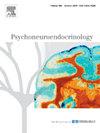Maternal cortisol concentration is associated with reduced brain activation to infant cry and more intrusive parenting behavior
IF 3.4
2区 医学
Q2 ENDOCRINOLOGY & METABOLISM
引用次数: 0
Abstract
Previous research indicates that maternal cortisol function and maternal brain response to infant are each in turn related to variations in parenting behavior. However, little is known about how maternal cortisol and maternal brain function are associated, thus studying these two mechanisms together may improve our understanding of how maternal cortisol assessed during interactions with own infant is associated with brain response to infant cry. First-time mothers (N = 59) of infants aged 3–4 months old were recruited to participate. Mothers’ cortisol concentration was measured during a naturalistic interaction with their infant and their behavior was coded for two parenting behaviors-- maternal sensitivity and non-intrusiveness. In an fMRI session, mothers listened to their own infant and a control infant crying. Higher cortisol concentration was associated with more intrusive behavior. We found greater cortisol concentration was further associated with decreased activation in the brain to infant cry in the right precentral gyrus, the left culmen extending into the left inferior temporal gyrus and fusiform, two clusters in the superior temporal gyrus, and in the medial frontal gyrus. We also found that lower activation in these regions was associated with more intrusive maternal behavior. These data demonstrate the associations between maternal cortisol concentration and reduced brain activation to infant cry in both motor planning and auditory processing regions in predicting intrusive parenting behavior.
母亲皮质醇浓度与婴儿啼哭时大脑激活程度降低和更多的侵入性养育行为有关
以往的研究表明,母体皮质醇功能和母体大脑对婴儿的反应反过来又与养育行为的变化有关。因此,将这两种机制结合在一起研究,可能会让我们更好地了解在与自己的婴儿互动过程中评估的母亲皮质醇与大脑对婴儿啼哭的反应之间的关系。我们招募了 3-4 个月大婴儿的初为人母者(59 人)参与研究。在与婴儿的自然互动过程中测量母亲的皮质醇浓度,并对她们的两种育儿行为进行编码--母亲的敏感性和非侵入性。在一次 fMRI 会话中,母亲们聆听了自己的婴儿和对照组婴儿的哭声。皮质醇浓度越高,干扰行为越多。我们发现,皮质醇浓度越高,大脑对婴儿哭声的激活程度越低,这与右侧中央前回、延伸至左侧颞下回和纺锤体的左侧culmen、颞上回的两个簇以及额叶内侧回有关。我们还发现,这些区域较低的激活与较强的侵入性母性行为有关。这些数据表明,母亲皮质醇浓度和大脑对婴儿哭声在运动规划和听觉处理区域的激活程度降低之间存在关联,可预测侵入性养育行为。
本文章由计算机程序翻译,如有差异,请以英文原文为准。
求助全文
约1分钟内获得全文
求助全文
来源期刊

Psychoneuroendocrinology
医学-精神病学
CiteScore
7.40
自引率
8.10%
发文量
268
审稿时长
66 days
期刊介绍:
Psychoneuroendocrinology publishes papers dealing with the interrelated disciplines of psychology, neurobiology, endocrinology, immunology, neurology, and psychiatry, with an emphasis on multidisciplinary studies aiming at integrating these disciplines in terms of either basic research or clinical implications. One of the main goals is to understand how a variety of psychobiological factors interact in the expression of the stress response as it relates to the development and/or maintenance of neuropsychiatric illnesses.
 求助内容:
求助内容: 应助结果提醒方式:
应助结果提醒方式:


